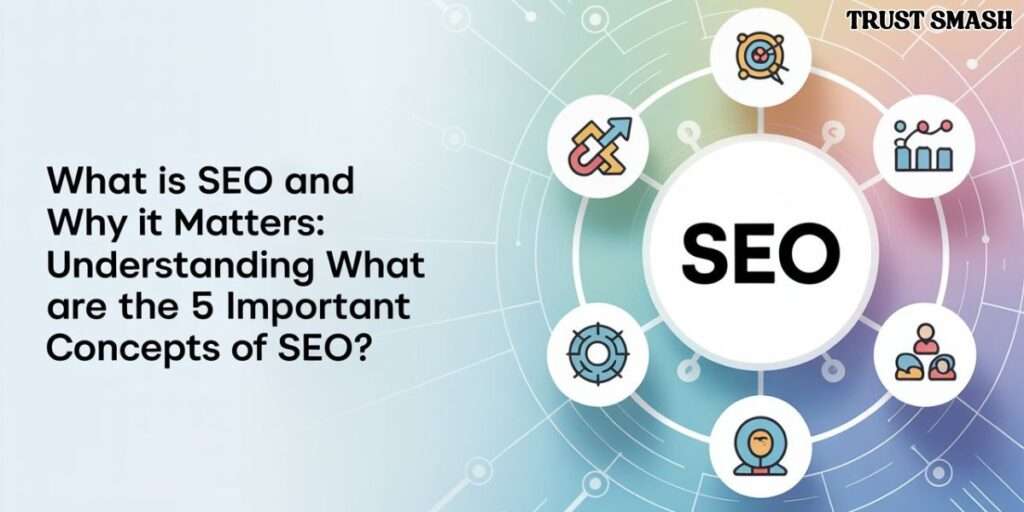Understanding What Are the 5 Important Concepts of SEO? is crucial for anyone wanting to boost their website’s visibility. SEO, or search engine optimization, involves various strategies that improve your site’s Google rankings and attract more organic traffic.
The five key concepts include keyword research, which helps identify what users search for, and on-page SEO, ensuring your content and meta tags are optimized.
Another vital concept is link building, which builds your site’s authority through quality backlinks. Finally, technical SEO aims to enhance your website’s crawlability and overall site structure, ensuring search engines can efficiently navigate and index your content.
A well-optimized backend supports faster loading times, reduces errors, and improves user experience, all of which contribute to stronger search engine optimization performance.. Mastering these concepts sets the foundation for long-term SEO success.
What Is SEO and Why Does It Matter: Understanding What Are the 5 Important Concepts of SEO?

Search engine optimization (SEO) is a blend of strategy and technical skill aimed at increasing your website’s visibility in search engine results pages (SERPs).
By aligning your content and site structure with how search engines like Google evaluate websites, SEO helps drive more organic traffic and improves overall online presence.. It involves tailoring your site’s content, structure, and performance to meet the evolving standards of Google’s algorithm, helping your pages rank higher and attract more organic traffic.. In 2025, SEO is more crucial than ever, as it directly influences your site’s visibility, organic traffic, and ultimately, your business’s success. By optimizing your website, you’re not just aiming for higher rankings; you’re striving to meet user intent, provide valuable content, and deliver an exceptional user experience.
A well-implemented SEO strategy ensures that your website is discoverable by search engines, leading to increased organic traffic. This organic traffic is highly valuable, as it often results in higher engagement and conversion rates compared to paid advertising. Moreover, with the rise of AI-driven search tools, having a robust SEO foundation allows your content to be effectively indexed and presented by these advanced systems.
SEO Fundamentals You Must Understand
At the core of SEO lies a set of fundamental principles that guide optimization efforts. These include understanding search intent, conducting thorough keyword research, and focusing on user experience (UX). Search intent is the underlying purpose behind a user’s query—what they’re truly looking to find or accomplish. When your content aligns closely with this intent, it becomes more relevant, increases engagement, and boosts your chances of ranking higher in organic search results by meeting both user needs and Google’s algorithm expectations.
Effective keyword research involves identifying terms and phrases that potential visitors are searching for. Tools like Ahrefs, Google Search Console, and Yoast SEO can assist in discovering high-traffic keywords with manageable competition. Naturally, integrating these keywords into your content allows search engines to better interpret the context and relevance of your page. This not only improves your chances of appearing in organic search results but also aligns your content with search intent, enhancing both visibility and user engagement.
Lastly, prioritizing user experience (UX) is paramount. A website that is easy to navigate, visually appealing, and fast-loading encourages visitors to stay longer, reducing bounce rates and signaling to search engines that your site is valuable.
Laying the Foundation: Technical Setup for SEO
A strong technical SEO foundation is crucial to ensure that search engines can properly crawl, index, and rank your website. Without optimized site structure, clean code, and efficient website performance, even great content may struggle to appear in search engine results pages (SERPs). Start by selecting a reliable website platform like WordPress, which offers flexibility and a plethora of SEO plugins. Adding an SSL/TLS certificate enables HTTPS security, which protects user data and builds trust. Google considers HTTPS a ranking signal, meaning that secure websites are more likely to perform better in search engine results. It’s also a key part of building strong technical SEO.
Refining your site’s URL structure to be clear, concise, and descriptive helps both users and search engines understand the page content. A well-structured URL improves crawlability, supports better internal linking, and enhances overall SEO visibility, making your pages easier to navigate and rank effectively. Utilize robots.txt files to guide search engine crawlers on which pages to index and which to avoid. Additionally, submitting an updated sitemap to search engines ensures that all your important pages are discovered and indexed promptly.
Creating a User-Friendly Website Experience

A user-friendly website is not only beneficial for visitors but also for SEO. Ensure your site is mobile-friendly, as Google predominantly uses mobile-first indexing. This means that your website’s mobile version is now treated as the main version by search engines when determining Google rankings. Ensuring mobile responsiveness is crucial, as poor performance on mobile can negatively impact your site’s visibility and overall SEO performance..
Page speed plays a vital role in your website’s success, as slow-loading pages often cause high bounce rates and reduced Google rankings. Fast-loading sites create a smoother user experience (UX) and keep visitors engaged. Tools like Google PageSpeed Insights are useful for diagnosing issues and improving overall website performance. Clear URL structures help search engines grasp the hierarchy and significance of your pages. This organization improves crawlability and ensures that important content gets prioritized in Google indexing and rankings.
Keyword Research That Actually Works
Effective keyword research goes beyond merely identifying popular terms; it’s about understanding the context and intent behind those searches. Utilize tools like Ahrefs and Google Search Console to discover keywords that align with your content and audience needs.
Incorporate a mix of short-tail and long-tail keywords to capture a broader audience. Long-tail keywords are highly specific phrases that often reveal clear search intent, making them valuable for attracting users who are closer to taking action. Because they target precise queries, these keywords typically face less competition and result in higher conversion rates compared to broad, generic terms.. Remember to analyze competitors’ keywords to uncover gaps and opportunities in your SEO strategy.
Mastering On-Page SEO Optimization
On-page SEO focuses on fine-tuning each webpage to improve its visibility in search results and attract more targeted organic traffic. This includes optimizing elements like meta tags, headings, content, and URL structure to align with search intent and boost Google rankings.
Start by crafting compelling meta tags, including titles and descriptions, that accurately reflect the content and incorporate target keywords.
Use internal linking to connect related content within your site, enhancing navigation and distributing page authority. Ensure that your content is well-structured with appropriate header tags (H1, H2, H3) to improve readability and SEO performance. Additionally, optimize images by using descriptive alt text and compressing them to improve page load times.
Content That Ranks: Strategies for 2025
In 2025, content remains king, but the emphasis is on creating content that aligns with search intent and provides genuine value. Focus on producing comprehensive, well-researched articles that answer users’ questions and solve their problems.
Use a mix of content formats like videos, infographics, and podcasts to appeal to diverse audience tastes and boost user interaction. Updating your old content frequently keeps the information fresh and reliable, showing search engines that your site is both current and a trusted source of valuable content.
Off-Page SEO: Building Authority
Off-page SEO includes all efforts made outside your actual website to boost its presence in search engine results. This primarily involves gaining high-quality backlinks, increasing brand mentions, and building trust and authority across the web—all of which help improve your site’s Google rankings.When trusted websites link back to your content, it tells search engines that your site is credible and carries authority, which can positively influence your rankings.
Engage in link-building strategies such as guest blogging, influencer collaborations, and creating shareable content like infographics and research studies. Active participation in relevant forums and social media platforms can also drive traffic and enhance your site’s authority.
Tracking & Improving SEO Performance
Monitoring your SEO performance is crucial for understanding what’s working and where improvements are needed. Utilize SEO tools like Google Analytics and Google Search Console to track metrics such as organic traffic, bounce rate, and keyword rankings.
Regularly analyze this data to identify trends, uncover issues, and make informed decisions to refine your SEO strategy. Setting up rank tracking allows you to monitor your positions for target keywords and assess the effectiveness of your optimization efforts.
Advanced Tips: AI, Search Intent & AEO
As AI continues to influence search behaviors, it’s essential to adapt your SEO strategies accordingly. Answer Engine Optimization (AEO) focuses on structuring content to directly answer user queries, increasing the likelihood of appearing in featured snippets and voice search results.
Understand and align with search intent to ensure your content meets the specific needs of users. Implementing structured data helps search engines comprehend your content better, enhancing the chances of your pages being featured in rich results.
Conclusion & Action Plan
To thrive in the competitive SEO landscape of 2025, it’s imperative to adopt a holistic approach that encompasses technical optimization, user experience, and content quality. Start by conducting a comprehensive SEO audit to identify areas for improvement.
Develop a content strategy that focuses on providing value and aligning with user intent. Regularly monitor your SEO performance using analytics tools and adjust your strategy as needed. By staying informed about SEO best practices and continuously optimizing your website, you can enhance your online visibility and achieve sustained success in search engine rankings.
Visit my website for more content !!!